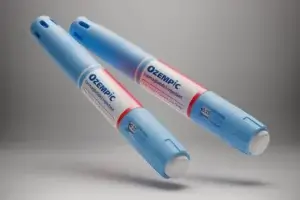Feder A, Costi S, Rutter SB, Collins AB, Govindarajulu U, Jha MK, Horn SR, Kautz M, Corniquel M, Collins KA, Bevilacqua L, Glasgow AM, Brallier J, Pietrzak RH, Murrough JW, Charney DS. A Randomized Controlled Trial of Repeated Ketamine Administration for Chronic Posttraumatic Stress Disorder. Am J Psychiatry. 2021 Feb 1;178(2):193-202. doi: 10.1176/appi.ajp.
2020.20050596. Epub 2021 Jan 5. PMID: 33397139.
Highlights:
- After repeated ketamine infusions, the ketamine group showed significantly greater improvement compared to the control group. 67% of ketamine patients responded well, compared to 20% of the control.
- Ketamine infusions were well tolerated overall, without serious adverse events.
- Individuals with chronic PTSD (N=30) were randomly assigned (1:1) to receive six infusions of ketamine (0.5 mg/kg) or midazolam (0.045 mg/kg) (psychoactive placebo control) over 2 consecutive weeks.
- Clinician-rated and self-report assessments were administered 24 hours after the first infusion and at weekly visits.
Results:
The ketamine group showed a significantly greater improvement in CAPS-5 and MADRS total scores than the midazolam group from baseline to week 2. At week 2, the mean CAPS-5 total score was 11.88 points (SE=3.96) lower in the ketamine group than in the midazolam group (d=1.13, 95% CI=0.36, 1.91). Sixty-seven percent of participants in the ketamine group were treatment responders, compared with 20% in the midazolam group. Among ketamine responders, the median time to loss of response was 27.5 days following the 2-week course of infusions. Ketamine infusions were well tolerated overall, without serious adverse events.
Conclusions:
This randomized controlled trial provides the first evidence of efficacy of repeated ketamine infusions in reducing symptom severity in individuals with chronic PTSD. Further studies are warranted to understand ketamine’s full potential as a treatment for chronic PTSD.













